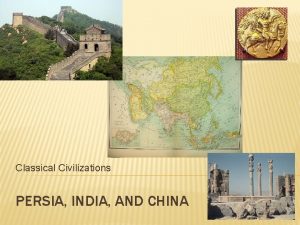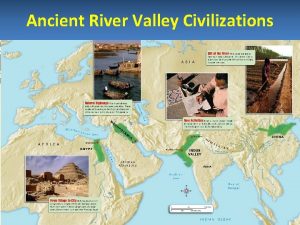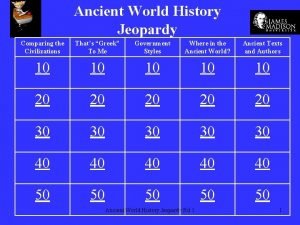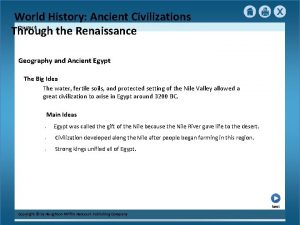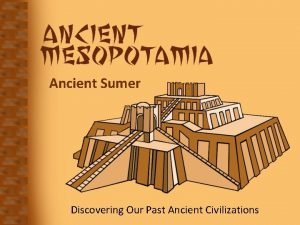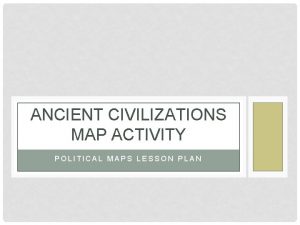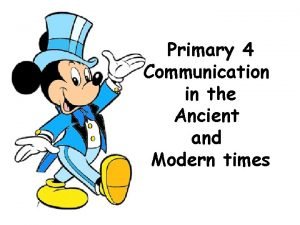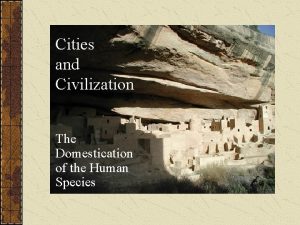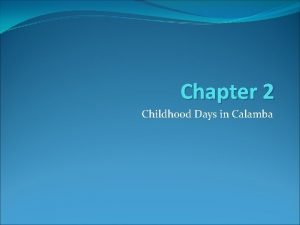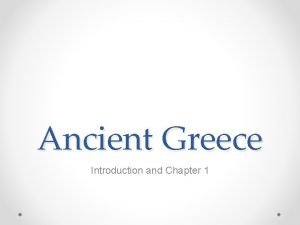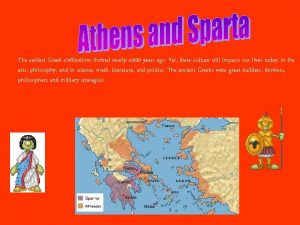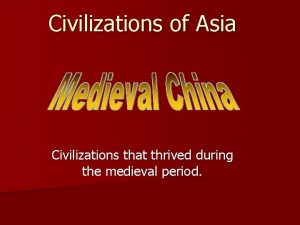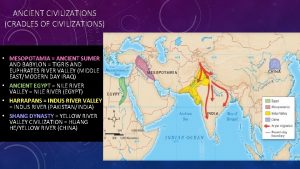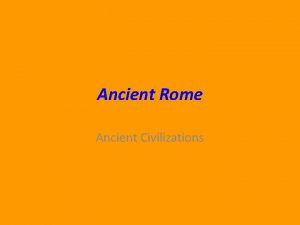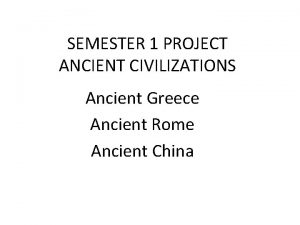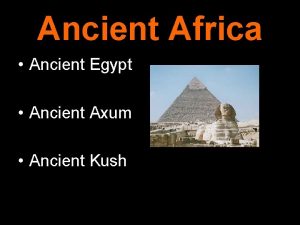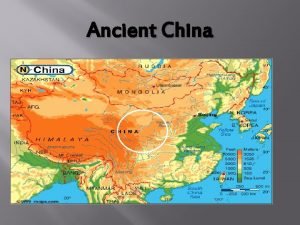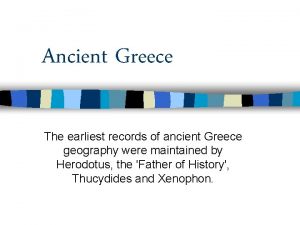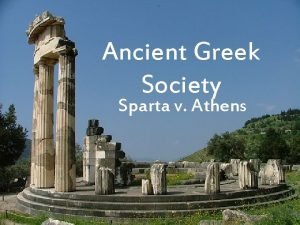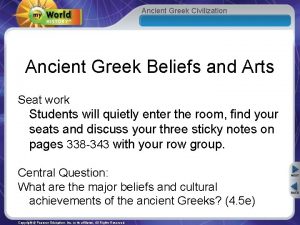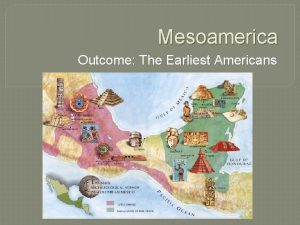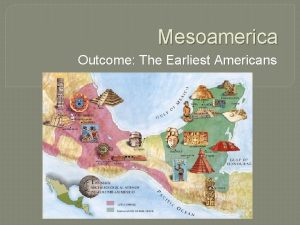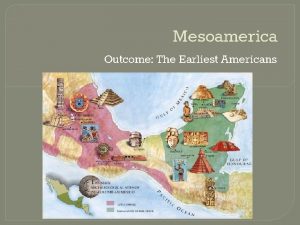Ancient Greek Life Earliest Greek civilizations thrived nearly




























- Slides: 28

Ancient Greek Life

• Earliest Greek civilizations thrived nearly 4, 000 years. • Their culture still impacts us today • arts • philosophy • math • science • literature • politics

Gifts the ancient Greeks gave to the world: • Trial by Jury • Greek Myths • Democracy • Tragedy and Comedy • Theatre • The Olympics

To be a citizen of a city-state: • Ancient Greeks referred to themselves as citizens of their individual city-states • Each city-state, or POLIS, had its own personality, goals, laws, and customs. • Ancient Greeks were very loyal to their city-state.

Greek men • Men ran the government • Spent a great deal of time away from home • When not busy with government, they spent their time in fields, sailing, hunting, in manufacturing, or in trade • For fun, they enjoyed drinking parties, wrestling, horseback riding or the Olympic games

Greek women • With the exception of Sparta, Greek women had very limited freedom outside the home • In the home, however, Greek women were in charge • Most Greek households had slaves to do the cooking and cleaning

Greek babies • Ancient Greeks considered their children to be “youths” until age 30 • When a child was born to a Greek family, the father would carry his child, in a ritual dance, around the household

Greek girls • With the exception of Sparta, girls in Athens and all other city-states stayed home until they were married • Their job was to help their mother and to help in the fields, if necessary

Greek boys • In most city-states, very young boys stayed at home helping in the fields, sailing, and fishing • At age 6 or 7, they went to school

Slaves • Slaves were very important to ancient Greek life • Slaves cleaned and cooked, worked in the fields, factories, shops, mines, and on ships • The police force in ancient Athens was made up of slaves

Slaves could not: • go to school • enter politics • use their own name • they were the property of their owner, not citizens of ancient Greece

How did people become slaves? • When captured in battle • Some were the children of slaves • Greek infants abandoned & left to die • Some children were sold into slavery by poor, desperate families • Some children were kidnapped into it

• Toys – Ancient Greek children played with rattles, little clay animals, horses on 4 wheels that could be pulled on a string, yoyos, and terra-cotta dolls • Pets – birds, dogs, goats, tortoises, and mice were all popular pets. Cats were not though!

Greek houses • Made up of 2 or 3 rooms, built around an open air courtyard • Women could enjoy fresh air in the privacy of their courtyard • Much of ancient Greek life centered around the courtyard

Ancient Greek Food • Along the coastline, the soil was not very fertile • Ancient Greeks used systems of irrigation and crop rotation to help solve the problem • They grew olives, grapes, and figs • They kept goats for milk and cheese

• In the plains where the soil was more rich, they grew wheat for bread • Fish, seafood, and home-made wine were very popular • Meat was rarely eaten, was used mostly for religious sacrifices

Clothing • Greek clothing was very simple • Men and women wore linen in the summer and wool in the winter • Ancient Greeks could buy clothes in the agora, the marketplace, but that was very expensive • Most families made their own clothes

Hairstyles • Both men and women enjoyed using mirrors and hairbrushes • Women kept their hair long at all times • Men cut their hair short, and unless they were soldiers, wore beards

Dance • Dance was very important to the ancient Greeks • Rarely did men and women dance together • There were more than 200 ancient Greek dances

Athens & Sparta • In ancient Athens, the purpose of education was to produce citizens trained in the arts. • In ancient Sparta, the purpose of education was to produce a well-drilled, welldisciplined marching army

Athens • Girls were not educated at school • From age 8 – 14, they went to a primary school or private school in the neighborhood

Sparta • Spartans believed in a life of discipline, self-denial, and simplicity • They were very loyal to the state of Sparta • Every Spartan, male or female, was required to have a perfect body

Spartan boys • Sent to military school at age 6 or 7 • Taught survival skills and other skills necessary to be a great soldier • School courses were difficult and often painful

• Although they were taught reading and writing • Only warfare mattered • It was a brutal training period • Between age 18 – 20, Spartan males had to pass a difficult test of fitness, military ability, and leadership skills

If they passed: • They became a full citizen and a Spartan soldier • Spartan soldiers spent most of their lives with fellow soldiers • They ate, slept, and continued to train with the others • If married, they did not live with their wives and families

If they failed: • They became a perioikos, a middle class member. • Were allowed to own property and have business dealings, but had no political rights and were not citizens.

Spartan girls • In Sparta, girls went to school at age 6 or 7 • They lived, slept, and trained in their sisterhood barracks • Girls were taught wrestling, gymnastics, and combat skills • Spartans believed that strong women would produce strong babies

• At age 18, Spartan girls were also put to a test of fitness and skills • If she passed: she would be assigned a husband was allowed to return home • If she failed: she would lose her rights as a citizen and become a perioikos, a member of the middle class. • In Sparta, citizen women enjoyed a great deal of freedom
 Where did the earliest civilizations develop
Where did the earliest civilizations develop Human geography of africa
Human geography of africa Map of river valley civilizations
Map of river valley civilizations Lesson 1 early civilizations
Lesson 1 early civilizations The two classical civilizations of ancient india were the
The two classical civilizations of ancient india were the Civilization ppt template
Civilization ppt template Ap world jeopardy
Ap world jeopardy Tigris euphrates and nile river
Tigris euphrates and nile river World history ancient civilizations through the renaissance
World history ancient civilizations through the renaissance Discovering our past ancient civilizations
Discovering our past ancient civilizations Political map activity
Political map activity Ancient time ancient means of communication pictures
Ancient time ancient means of communication pictures Ancient india vs ancient china
Ancient india vs ancient china Urban hearths
Urban hearths Socio-cultural impacts
Socio-cultural impacts The are our earliest literature
The are our earliest literature The earliest bridges consisted mainly of
The earliest bridges consisted mainly of Prometheus background
Prometheus background Fish tail bird
Fish tail bird Earliest urban hearths
Earliest urban hearths Earliest start time formula
Earliest start time formula Jose rizal childhood
Jose rizal childhood Pericles and the bull
Pericles and the bull Short history of tennis
Short history of tennis Origin of gymnastics
Origin of gymnastics The earliest fossils date back to about when?
The earliest fossils date back to about when? Earliest earth
Earliest earth Berlo's model of communication advantages
Berlo's model of communication advantages Earliest comedian
Earliest comedian




